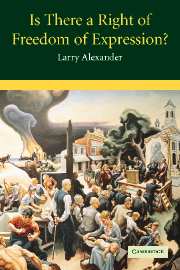Book contents
- Frontmatter
- Contents
- Acknowledgments
- Introduction
- PART ONE DEFINING HUMAN RIGHTS AND DELIMITING THE SCOPE OF FREEDOM OF EXPRESSION
- PART TWO THE CORE OF FREEDOM OF EXPRESSION: GOVERNMENT REGULATIONS AND ACTS TAKEN TO AFFECT MESSAGES
- 4 The Core of Freedom of Expression: Regulations of Conduct for the Purpose of Affecting Messages Received
- 5 Track Three: Government Speech and Subsidies of Speech
- 6 Miscellaneous Regulations of Expression
- PART THREE THEORETICAL PERSPECTIVES ON FREEDOM OF EXPRESSION
- EPILOGUE
- Index
6 - Miscellaneous Regulations of Expression
Published online by Cambridge University Press: 07 January 2010
- Frontmatter
- Contents
- Acknowledgments
- Introduction
- PART ONE DEFINING HUMAN RIGHTS AND DELIMITING THE SCOPE OF FREEDOM OF EXPRESSION
- PART TWO THE CORE OF FREEDOM OF EXPRESSION: GOVERNMENT REGULATIONS AND ACTS TAKEN TO AFFECT MESSAGES
- 4 The Core of Freedom of Expression: Regulations of Conduct for the Purpose of Affecting Messages Received
- 5 Track Three: Government Speech and Subsidies of Speech
- 6 Miscellaneous Regulations of Expression
- PART THREE THEORETICAL PERSPECTIVES ON FREEDOM OF EXPRESSION
- EPILOGUE
- Index
Summary
In this chapter I take up some areas of regulation that are thought to implicate freedom of expression but that are not usually placed within Tracks One, Two, or Three. In fact, however, I shall attempt to show that each one of this disparate group of regulations falls squarely within one of these tracks and raises considerations quite similar to those already discussed.
The Speech, Beliefs, and Affiliations of Government Employees
Governments tend both to regulate the expression of their employees and to make certain beliefs and affiliations disqualifying for government employment. We have already dealt in Chapter Five with those cases in which government has a message that it wishes its employees to deliver. If, for example, there are to be public schools with prescribed curricula, then public schoolteachers – government employees – will perforce need to speak as government prescribes, at least while on the job. But what if the schoolteacher, after school, publicly disavows the curriculum, gainsays its content, and blisteringly criticizes the school board, her principal, and her more accepting colleagues? May she be fired for undermining the education of her pupils and the morale of the workplace? And what if she belongs to an organization the positions of which are antagonistic to the policies of her public employer? May that affiliation provide the grounds for deeming her unqualified for the government job she holds or seeks? In this section I address both issues.
- Type
- Chapter
- Information
- Is There a Right of Freedom of Expression? , pp. 103 - 124Publisher: Cambridge University PressPrint publication year: 2005



